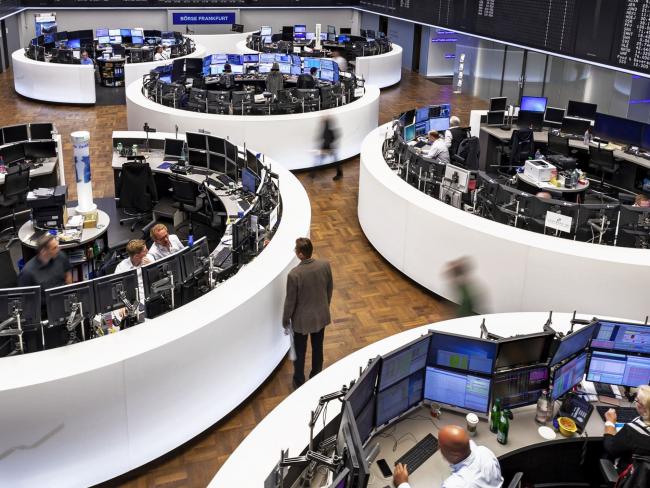(Bloomberg) -- European stocks posted their steepest drop this century as investors already reeling from the U.S. travel ban were left underwhelmed by the European Central Bank’s policy measures to combat the impact of the coronavirus.
The Stoxx Europe 600 Index dropped as much as 10% after the ECB’s decision to keep key rates unchanged, while boosting quantitative easing and liquidity tools. All 19 industry groups tumbled at least 9%, the travel and leisure extending its streak as the current sell-off’s biggest loser with a 13% drop.
European stocks have tumbled since last month’s record high, with the global policy response so far inspiring little confidence that the fallout from the spreading virus will be contained.
The ECB left its deposit facility rate and its main refinancing rate unchanged, while it added 120 billion euros ($135 billion) of net asset purchases through the end of 2020. Shares of banks nevertheless extended their drop to 12%.
U.S. stocks plunged at the open as President Donald Trump late Wednesday announced a sweeping 30-day ban on travel from Europe excluding the U.K., with the Department of Homeland Security later clarifying that the restriction applies generally to foreigners who’ve been in Europe within 14 days.
Here are further comments from market participants:
Holger Schmieding, Berenberg
- “None of the ECB’s measures or any other monetary, fiscal or regulatory policy initiative can be the circuit breaker in the recession into which the eurozone seems to have fallen this month, in our view. But the ECB package, and further steps by bank supervisors as well as by fiscal policy, can limit second-round effects. The ECB today has made it even less likely that the severe Covid-19 shock to the real economy could morph into a financial crisis. The ECB package also raises the hope that, once the medical outlook has become clearer, the Eurozone economy will be in a better position than otherwise to recover from the current severe shock to supply and demand.”
- “It’s not a liquidity problem. This battle is for Merkel to step up and fight, Lagarde is the foot soldier in this coronavirus war. Market needs to see decisive and effective political and fiscal leadership from the EU. Good first step but not enough to lift the mood and change sentiments. We need strong fiscal response. Monetary policy bullet is spent and just a band-aid.”
- “The fact that the ECB didn’t go for more negative interest rates tells you about the complete lack of coordination between the United States and the EU. More negative interest rates are likely seen as a devaluation by the US at the time of heavy trade negotiations and a travel ban.”
- “While the initial reaction of banks and broader equities was lower, I suspect bank investors will quickly see that the ECB actions are aimed at supporting banks and their investment cases are improved in light of Temporary Capital and Operational Relief as opposed to lower interest rates.”
- “The ECB is trying to do its part to manage the crisis. The deposit rate was not further reduced, but other means are in focus. Small and medium-sized businesses in particular now need access to liquidity. The banking sector cannot help in all cases due to strict regulations. The ECB’s decision to relax regulations for banks’ capital ratios is therefore correct. In addition, however, flanking government special credit programs are now needed.”
- “The ECB has stepped up to the plate and joined other major central banks with measures to try and stabilise the economic shock being caused by COVID-19. The fact that rates haven’t been cut doesn’t really matter as it wouldn’t have made much difference, but the market will be disappointed by that. It’s all about the liquidity package, which at first glance looks to be the targeted response that was promised.”
- “So far we have seen numerous easing measures from central banks, but markets have yet to respond positively as we have not yet, outside the UK’s budget yesterday, seen the fiscal response which is expected. The market remains focused on the short term cash flow problems that the economic lock downs will create and debt markets are pricing in a deterioration of credit quality and rise in defaults and downgrades. For companies with strong balance sheets this provides good opportunities for long term investors, and for companies with weak balance sheets they should grab the loans while they can. I expect stronger and more coordinated fiscal measures to be deployed soon.”

- “We are at the lower bound and the ECB can’t do much more. I think the package is sensitive and gut as it provides more liquidity and a reduction in capital requirements. Very balanced. Risk assets should now stabilise at this level.”